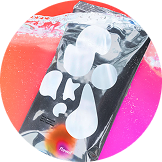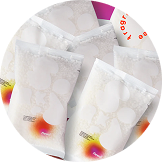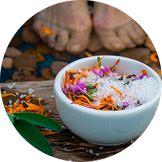Maybe you’re tense for no clear reason, or your thoughts won’t seem to slow down. Even small tasks feel overwhelming. You’ve tried deep breaths, journaling, and scrolling through advice posts at 2 AM, wondering if something deeper might be going on.
So, can low serotonin cause anxiety? There’s a very strong chance that’s the case. We’ll take a closer look at the link between serotonin and anxiety to help you get to the bottom of this issue and take back control of your life.
Serotonin plays a major role in how we handle stress, regulate mood, and process fear, so it makes sense that you don’t feel great about yourself when serotonin levels fall off a cliff. Anxiety can quickly take over.
That’s why rebuilding your serotonin system through supportive self-care is so important. And it doesn’t have to involve another pill or supplement. Our serotonin bath soak could be all you need.
This powerful, first-of-its-kind magnesium bath soak is designed to help naturally refuel your body with serotonin-supporting nutrients like magnesium, Vitamins B3 & B6, and brain-boosting nootropics for stress relief that can last up to 5 days.
Add it to your self-care ritual today and smash the sads away!
What is Serotonin?
Serotonin is a neurotransmitter, which is just a fancy name for a chemical messenger. It helps regulate a wide range of essential functions in the brain and body, including mood, sleep, appetite, digestion, and even how we process pain.
It’s often referred to as the “feel-good” hormone, and it’s easy to see why. It keeps your emotional responses balanced and your stress levels in check.
Most of your serotonin isn’t actually made in the brain, contrary to what many people assume. Instead, it’s produced in the gut. That said, it still has a pretty profound influence on how your brain functions, especially when it comes to anxiety and emotional regulation.
So, what’s the connection between serotonin and anxiety?
Can Low Serotonin Cause Anxiety?
The link between serotonin and anxiety is complex. So can low serotonin cause anxiety? We’ve always been led to believe that’s the case. The short answer is low serotonin doesn’t cause anxiety as much as it can contribute to a stronger sense of anxiety that’s already there.
Serotonin is just one piece of the puzzle, though, and as you’ll discover below, too much of a good thing can be detrimental as well.
What Happens When Serotonin Levels Are Low?
Your brain becomes less equipped to regulate mood, manage stress, and process emotional input without ample serotonin. This creates the perfect environment for anxiety to thrive.
You might find yourself more sensitive to conflict, easily overwhelmed by daily tasks, or stuck in cycles of worry you can’t control. Clinical studies found that individuals with generalized anxiety disorder (GAD), panic disorder, and social anxiety often show reduced serotonin activity, too.
Serotonin can plummet from low production, poor release, or inefficient receptor function. At any rate, your nervous system can’t keep things calm without enough serotonin flowing where it’s needed.
How Serotonin Regulates Emotion and Fear
Serotonin plays a key role in helping the brain interpret and respond to threats. It modulates activity in the amygdala, which is your brain’s “fear center.” It’s here that your fight-or-flight response is regulated.
Think of serotonin as a “braking system” for fear-based signals. You can feel healthy concern or caution without spiraling into a full-blown panic attack when serotonin levels are dialed in.
It also helps shift your focus away from negative stimuli so you’re not constantly scanning for danger, something so many of us are guilty of. We always expect the worst and actively seek it out.
Here’s the problem: that emotional buffer weakens without enough serotonin, so the brain can misfire and, in turn, interpret everyday stressors as serious threats. You’ll be on edge for no real reason.
Why “Normal” Serotonin Might Not Be Enough
Yes, your body produces its own serotonin naturally. You might have plenty of serotonin as is. So why do you feel so anxious still? The way your body uses serotonin matters just as much as how much you have.
Genetic variations in serotonin receptors, transporters, and enzymes can impact how well your brain responds to this neurotransmitter. Hormonal shifts (like spikes in cortisol or drops in estrogen) can also get in the way of serotonin signaling.
In other words, your system might still be struggling to maintain emotional stability and resist stress-related spirals even if your serotonin levels look fine. Things get tricky, though, when you look closer at the connection between serotonin and anxiety.
Can Too Much Serotonin Cause Anxiety?
We get asked all the time, can too much serotonin cause anxiety? Unfortunately, the answer is yes. Thus, it’s not as simple as ramping up your body’s serotonin levels as much as possible. There’s a lot more nuance at play.
Too much serotonin can lead to a condition called serotonin syndrome, usually triggered by combining certain medications or taking high doses of serotonin-boosting drugs. So, you won’t have to worry about this if you’re just making lifestyle changes or trying our anxiety bath soak.
Still, it’s important to know what’s going on with serotonin syndrome. The nervous system becomes overstimulated in this state, which can exacerbate anxiety, restlessness, sweating, tremors, and even confusion.
Fortunately, this is pretty rare. It’s unlikely that “too much” serotonin alone causes anxiety. In fact, most people find that increasing serotonin function (safely and naturally, of course) actually reduces anxiety rather than triggering it.
Low Serotonin Isn’t the Whole Story, Though
So can low serotonin cause anxiety? Yes, but remember that it’s just one piece of the puzzle. Anxiety is all around you, and external stressors are always going to be a factor. That’s why supporting anxiety means zooming out.
Chronic stress, nutrient deficiencies (especially magnesium and B vitamins), poor sleep, gut imbalances, and trauma history all shape how you handle anxiety.
You could have moderately low serotonin and still feel calm if other systems are balanced, or have “okay” levels and still struggle due to dysfunction elsewhere. That’s why it's more effective to care for your whole nervous system instead of chasing serotonin levels alone.
That’s the approach we take with our stress relief bath soak recipes here at Flewd Stresscare, where you’ll discover the #1 epsom salt alternative for making you more resilient to stress and its harmful effects.
How Can You Raise Serotonin Levels to a Healthier Level and Manage Anxiety?
Be it ashwagandha vs magnesium, there are plenty of solutions that claim to help support a healthier response to stress. Now that you know the connection between serotonin and anxiety, let’s look at what actually works to help you get back to living life on your own terms.
Natural Supplements That May Help
The supplements we’ve seen work best are those that play a direct role in serotonin production. There are three that come to mind: magnesium, vitamin B6, and vitamin B3 (niacin). Each helps convert tryptophan, the amino acid precursor, into serotonin.
Supplements like L-tryptophan or 5-HTP (5-hydroxytryptophan) are also commonly used to support this process. Omega-3 fatty acids, zinc, and probiotics also contribute to better brain function and mood regulation, indirectly supporting healthier serotonin signaling.
But we don’t want to overcomplicate this by throwing a laundry list of potential solutions at you. Let’s keep things simple. There’s one powerful product that brings together Mother Nature’s finest to help you feel like yourself once again. Harness the magnesium soak benefits today!
Try Our Serotonin Soak at Flewd Stresscare!
At Flewd Stresscare, we’ve developed the first magnesium bath soak designed specifically to support your serotonin system. More than 100,000 happy customers and counting rely on our soaks, and the results speak for themselves:
“The anti-anxiety soak helps me unwind every night! I can’t imagine it not being a part of my routine now.” - Ally
“This stuff works so well. It has lowered my anxiety and completely relaxes me. I feel better for a few days after even!” - April
“I suffered from anxiety, this soak has helped me relax and unwind tremendously. I love the scent as well. Definitely a subscriber. Can't wait to try all the different soaks.” - Lissa
It’s all possible because we combine the best magnesium for stress, magnesium chloride, with proven ingredients like Vitamin B3 and B6. These work in synergy to create neurotransmitters that regulate emotions, especially mood-lifting serotonin. We’ve also included nootropic Lithium, a nutraceutical that works its way into brain cells to greatly benefit mood.
Just 20 minutes in the tub can help you refuel on mood-balancing nutrients your body needs to feel calm, steady, and supported for days after the fact. Just use the soak 2-3 times a week and you’ll be well on your way to keeping those anxious thoughts at bay!
Lifestyle and Dietary Changes That Support Serotonin
What you eat and how you live can dramatically impact serotonin, too. Diets rich in complex carbs, lean protein, and fermented foods provide key building blocks for serotonin and support healthy gut-brain communication (about 90% of serotonin is made in the gut, after all!).
Movement helps too. You should make regular exercise, sunlight exposure, and consistent sleep patterns a top priority to boost serotonin activity.
Even something as simple as regular breathwork and spending time in nature have measurable effects. These aren’t quick fixes, but they create a more stable emotional baseline over time.
Medications That Target Serotonin
Hopefully our serotonin soak is all you need to get back to feeling like yourself again. But if not, there may come a time when prescription medication is part of the picture.
SSRIs (Selective Serotonin Reuptake Inhibitors) like sertraline or fluoxetine increase serotonin availability in the brain and are often used for generalized anxiety or panic disorders.
Just know that while they work for some, they can come with some scary side effects, especially during the adjustment period. You’ll have to work with a provider to weigh the risks, monitor your response, and figure out if this is what you need in the long term.
That said, we feel confident you’ll notice a difference after a few weeks of using our soaks on a regular basis. Try them first and see if you can avoid prescription drugs altogether, and regain your inner zen!
Parting Thoughts on Low Serotonin and Anxiety Disorders
Low serotonin doesn't cause anxiety on its own, but it can make your brain more reactive to stress, fear, and overwhelm. We hope our conversation on low serotonin and anxiety disorders has left you with a clear understanding of the connection and what your next steps should be.
Our blog has additional resources on topics like magnesium flakes vs epsom salt or magnesium chloride vs magnesium sulfate if you want to learn more about how magnesium soaks can help you feel more like your old self once again.
But, the sooner you start soaking, the sooner you can replenish your body with stress-busting, serotonin-boosting nutrients. So what are you waiting for? Give your mind what it’s missing, one soak at a time.
























































